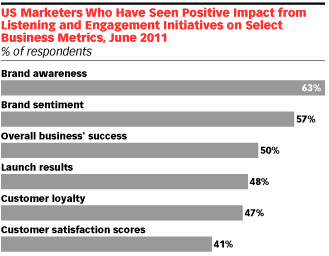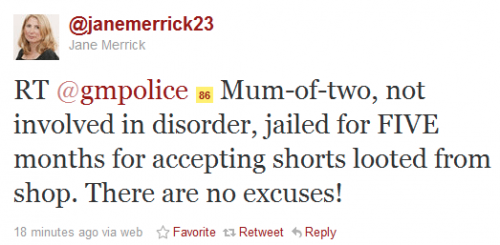We Are Social's Monday Mashup #83
Listening and responding really does work
An interesting bit of research from Forrester, with one notable conclusion: 50% of businesses have seen a notable increase in their overall business’ success, just through listening and responding in social media:

Facebook Messenger launches
Last week saw the launch of Facebook Messenger a new service designed to ‘simplify how messaging works, and gives you a faster way to message friends and small groups.
Messenger is a separate app, so it only takes one click to get to your messages or send a new one. Messages are delivered through notifications and texts, so your friends are more likely to get them right away’.
Inside Mobile Apps have an interesting interview with Lucy Zhang, the founder of Beluga, the app which Facebook Messenger sprang from.
Facebook aggregates status updates in news feed
Facebook launched a new feature last week, where the news feed aggregates posts about the same topic together, linking them to a relevant page.

There is a real chance that this will help brands’ Pages grow, with them appearing in the News Feed with an ‘organic’ social recommendation.
Facebook launches targeted advertising by postcode
In a move which is undoubtedly designed to get more small, local retailers advertising on the site, Facebook has added postcode targeting to its ad tool. Interesting.

Google+ add games, launches blog, adds social search
Google wants people to spend more time using + and therefore are trying to give it richer content – starting with adding a separate Games stream. The initial set of Games includes, you guessed it, Angry Birds – and it’s attracting such big developers, because Google only wants to take 5% of game revenues, as opposed to Facebook which takes 30%.

Google have also launched a Google+ Platform blog for developers, and started adding public Google+ Posts to Google search results.
Twitter launches two new feed tabs
In a change which will make Twitter.com more like the Facebook feed, Twitter have launched two new feeds: one, which is named after your username (eg arsereview) amalgamates all the interactions with your account, be it Mentions, Retweets, or Favourites; the other is the Activity tab, and brings together all the different actions from the accounts you follow on Twitter. Clever.
LinkedIn backtracks on social ads
After a user backlash on using pictures in social ads without actively asking for permission, LinkedIn was forced to pull the ad mechanic – instead reverting to the number of connections who had recommended a product. With the site trying to prove to the stock market it can make money, it’s a blow for LinkedIn.
Amazon launches a Kindle social network
Amazon have launched a quasi social network for Kindle users: readers can now create their own user profile and post updates on what they’re reading, etc. It’s unclear at the moment whether these users will also post updates about standing in the way of everyone on the tube while reading, refusing to get out of the way when asked, and generally just being exceptionally obnoxious.
Skype details future plans
Forbes carried an interesting interview with Neil Stevens, VP of Skype about their future plans with Microsoft and Facebook. The most interesting thing he revealed is that over the coming weeks, Skype will launch a service which allows users to ‘call in’ to Facebook users. He also revealed they’ll be launching a premium service to allow Facebook users to call external phones.
New app Banjo lets users stalk locations
A good story from Techcrunch, about Banjo, which has reported high growth:
Banjo, for those unaware, is a new social discovery service which reveals the social network present at any given location at a particular time. To be clear, it’s not another social network, it’s a layer on top of social networks. With Banjo, you don’t have to create a profile, add friends or collect followers, or perform any of the other typical social networking behaviours.
Now, you can enter in any address supported by Google Maps in order to discover that location’s hidden social network, whether the location you seek is a city, a street address or even the name of a local business.
There are certainly some use cases for this feature that will appeal to mainstream users – perhaps you’re curious what people think of tonight’s concert, for example, or what people at a conference are posting pictures of or are tweeting about.
Twitpic founder launches Twitter clone
What do they say? What goes around comes around. After Twitter ripped off Twitpic, Twitpic founder Noah Everett has released Heello, which is a complete Twitter rip-off; despite its low chances of success, it’s picked up some comedic initial accounts.
London riots give Twitter spike in UK traffic
Twitter achieved its biggest ever day of traffic in the UK as a direct by-product of the London riots, with users logging in to find out what was happening. The graph below shows that it achieved 15% more traffic than from the last spike around super-injunctions.

UK riots: the full social media story
British Prime Minister David Cameron suggested last week that social networks could be shut down during periods of civil disobedience in order to stem the violence – a move echoed by Tory MP and active Twitter user Louise Mensch. The move was widely condemned as repressive, and a breach of freedom of speech.
The Wall Blog carried an excellent post about how, although in some instances people had used Facebook to incite trouble, by and large, social networks have acted as a force for good during the riots.
The exception to this was Blackberry Messenger, which by all accounts, fed the riots.
Social media has done so much good in the wake of the riots: be it the Keep Aaron Cutting site which raised £25k for a Tottenham barber, the Something Nice for Ashraf Tumblr which aimed to support the attacked Malaysian student (and raised £22k), the video that went viral of a Hackney grandmother haranguing looters, Twitter users getting together to clean-up the mess from the riots, or Leon Piers who cycled around and provided only verified information on Twitter about the riots in Bristol.
Amidst all the devastation, there was also time for some lolz, including Photoshop Looter and some nice editing.

One of the biggest talking points post-riots has been the sentences handed down. Greater Manchester Police suffered something of a backlash for tweeting the details of all those sentenced, and were absolutely hammered for passing comment on one of the sentences. Policed by the Twitter police.

